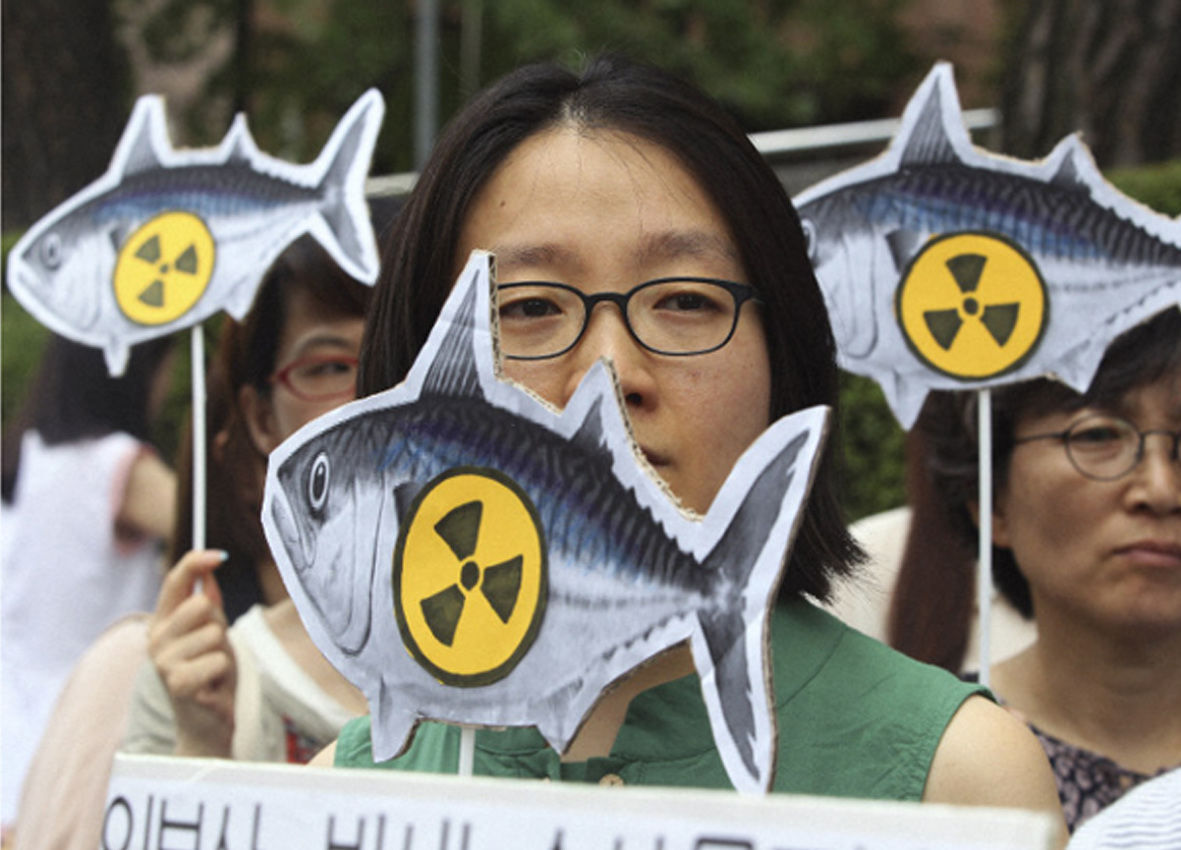
WTO backs S. Korean ban on Japanese seafood, reverses earlier ruling
GENEVA (Kyodo) -- The World Trade Organization ruled Thursday in favor of a South Korean ban on imports of some Japanese fishery products introduced in the wake of the 2011 Fukushima nuclear disaster, reversing an earlier decision against the restrictions.
The decision, delivered by the WTO's appellate body for dispute settlement, the highest judicial entity of the WTO dispute settlement mechanism, leaves Japan with no recourse in a legal battle that has dragged on for years.
The appellate body invalidated the conclusions of a dispute settlement panel that made the earlier decision because of several errors made by the latter in investigating the dispute.
Tokyo expressed disappointment with the ruling, with Foreign Minister Taro Kono saying in a statement that "Japan's position of calling on South Korea to scrap the measures remains unchanged."
After a powerful earthquake and tsunami triggered a meltdown at the Fukushima Daiichi nuclear power plant in March 2011, South Korea imposed a partial ban on fishery products from Fukushima and seven other prefectures due to fears of radioactive contamination.
In September 2013, South Korea expanded the restrictions to include all fishery products from the eight prefectures and tightened testing requirements.
While dozens of countries imposed some sort of import restrictions on Japanese food products following the Fukushima crisis, Japan had argued that the South Korean restrictions were far too strict.
After bilateral consultations reached a dead-end, Tokyo filed a complaint with the WTO in August 2015, which covered 28 species and mollusks.
The dispute settlement panel said in February 2018 that the testing requirements and blanket ban were "more trade-restrictive than necessary" and broke WTO rules barring measures that "arbitrarily or unjustifiably discriminate" between members.
The panel recommended that the restrictions be lifted on the 28 species of fish and mollusks including Alaska pollock and blue mackerel as requested by Japan. Seoul appealed the decision in April that year.
Source: https://mainichi.jp/english/articles/20190412/p2g/00m/0bu/002000c
 English
English Japan
Japan

prednisone to methylpred prednisone brand name us will prednisone make you gain weight how to taper prednisone 40 mg
average age for viagra sildenafil 100 mg extreme couponing at walgreens viagra online kaufen best prices on viagra 100 mg viagra street price substitute for viagra and cialis
plaquenil arthritis [url=https://pla-que-nil.com/#]plaquenil 500 [/url] effects of plaquenil on cbc how does plaquenil work for arthritis
goodrx compare drug prices compare cialis 20 mg cost at cvs herbal viagra kroger bottled water recall does cvs have generic viagra how does viagra work viagra testimonials forums vigora 100 mg in canada order prescriptions online without doctor viagra sans ordonnance request medication samples for physicians how does viagra work video viagra cost per 100mg pill male supplements that really work viagra prices hrac mode of action sildenafil citrate purple generic substitute for viagra viagra pornhub fda approved drugs does female viagra really work viagra cost tadalafil 20mg lowest price herbs for women's libido viagra pill 10 worst foods to eat liquid cialis dosage how does viagra work best what is viagra flomax and ejaculation problems
neurontin during pregnancy gabapentin rx discount is neurontin the same as gabapentin what happens when you snort gabapentin
neurontin contraindications how does neurontin make you feel how to pronounce gabapentin
albuterol dosing what is ventolin hfa used for how to use albuterol inhaler
plaquenil toxicity symptoms hydroxychloroquine 700 mg plaquenil dose for covid 19 what is side effects of plaquenil
zithromax chlamydia azithromycin canada price azithromycin and alcohol how long after what is azithromycin prescribed for
inhaler ventolin albuterol discount ventolin hfa inh w/dos ctr what drug company makes ventolin
online medical consultation viagra benefits for men most effective dose of viagra viagra cvs granuflo settlements paid does cvs take printed coupons sildenafil 20 mg tablet cost at walmart
levalbuterol vs albuterol albuterol purchase without prescription canada proventil hfa vs ventolin hfa which of the following describes the action of an inhaler such as albuterol?
alternatives to prednisone prednisone buy nz can prednisone affect your period how long for prednisone to get out of system
ventolin aphex twin where to get albuterol ventolin inhalers over the counter how to use albuterol sulfate inhalation solution without nebulizer
prednisone tablets prednisone cost can you be allergic to prednisone why do i feel so good on prednisone
viagra use in dogs free prescription coupons online drugs that increase libido in men viagra naturel female pink viagra 100mg pills lowest price generic viagra 100mg how to make real viagra
generic furosemide buy lasix cheap furosemide 20 mg pill identifier how long does furosemide stay in your system
plaquenil and corona hydroxychloroquine medication long term use of plaquenil icd 10 is there an ed treatment when taking plaquenil ever be stopped abruptly
walmart pharmacy prices for cialis ins phone numbers united states viagra pornhub viagra samples physician amazon pharmacy